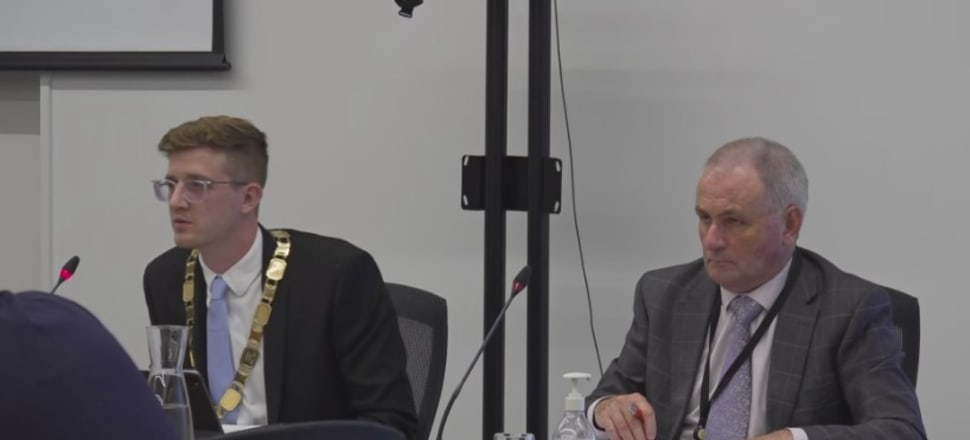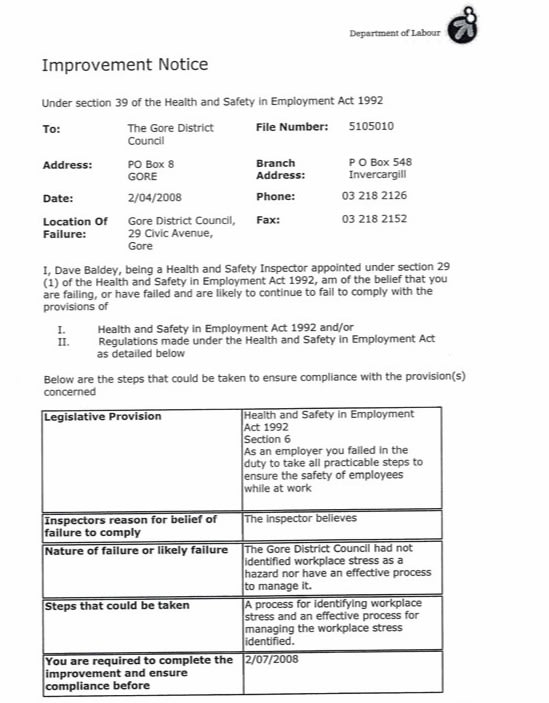
A Newsroom inquiry into nearly two decades of alleged bullying at the Gore council talks to more than a dozen departees, including the former finance chief. Vaneesa Bellew reports.
Long before new Mayor Ben Bell was narrowly elected, the Gore District Council was caught in allegations of a culture of bullying, including an inquiry by the Labour Department - but ex-staff say over two decades not enough was done.
Gore's troubles have hit national prominence with the standoff between Bell, aged 24, and the longstanding chief executive Stephen Parry, 60. The men's relationship broke down not long after Bell became the country's youngest mayor in October and it is now the subject of a review called for by councillors. [Update: on Thursday afternoon, seven of the 11 councillors including the deputy mayor called on Bell to resign, and when he refused, called an emergency meeting next Tuesday to put a vote of no confidence.]
Parry, a former Waitomo district mayor, has been at the council since 2001, most of that time with former mayor Tracy Hicks at the helm. He is a former Corrections Department manager at a prison and a former president of Taituarā — Local Government Professionals Aotearoa.
Newsroom's inquiries, speaking to 14 former staff, elected representatives and professional advisors and inspecting numerous signed statements, allegations, responses and inquiry findings from the early 2000s until today, reveal the following claims:
- A renewed call for an independent inquiry into the council and its culture
- That problems continued long after the Labour Department put the council on notice for its deficient systems for dealing with bullying
- The council has paid out hundreds of thousands in severance settlements with staff, many with non-disclosure agreements
- One dispute, with a former top executive Rebecca Tayler, who is the mother of new mayor Bell, cost the former council more than $300,000 in legal fees
- In 2019, a community group believed it had identified nearly 90 former staff from the council who had been victims of the council's culture but few could go public because of secrecy agreements
- A chief financial officer who suffered mental health issues after being forced out has spoken out, including about the circumstances of chief executive Parry arriving unannounced on his doorstep in London and intimidating him long after his departure
- Long-time former Mayor Tracy Hicks and other elected officials did not eliminate the conduct despite the Labour Department finding need for improvement, and periodic public controversy
Multiple ex-staff, who have been employed by the Gore District Council over the past decade, have told Newsroom they have been impacted by what they believed was a “toxic” work environment.
The ex-employees believe there needs to be an independent investigation into how the council staffers were treated, as well as into the money it spent on employment-related matters with staff and ex-staff over the past two decades.
The council’s former chief financial officer Doug Walker, who was one of four ex-staff who lodged the complaint with the Department of Labour, is also speaking out to Newsroom after 15 years, about his experience at the council.
On Thursday morning, the council issued a statement to Newsroom in Parry's name confirming it had paid $413,000 in severance payments to around 20 staff between 2005 and 2022, but noted it was one of the area's largest employers with 99 staff. It said any organisation could face claims from staff and if they had substance, these had to be professionally handled.
The council quoted staff survey statistics that three-quarters believed the council had effective governance in health and safety policy and 73 percent felt the management created an environment of trust and fairness.
Human cost
However, multiple former council employees have told Newsroom they are concerned about the management style and the council's treatment of some ex-colleagues.
Newsroom has been told past employees have been left “shattered” and their confidence destroyed after working for the council.
Many of the ex-employees spoken to believed the council "got rid of" people because they were no longer liked or because they made minor mistakes.
One said a "general consensus" of those who felt bullied was that people could be pursued "for basically no good reason".
“And... there's no compromise, there is no second chance, that’s it.”
Their colleagues had been stripped of their self-confidence and some had decided to leave the council without another job to go to.
“Even though you might think you have done the best job you can, how can you be confident to front up to another manager, another business, another organisation and say “I can do a good job” when that has happened? It's devastating.”
They believed if they wanted to raise a concern about being unfairly treated or bullied by bosses there was nowhere internally they could go for help.
“The reality is if the council had been following decent employment practices I should have been protected,” said one ex-employee.
Newsroom was told by multiple ex-staff of a “culture of fear” where employees felt they were not allowed to make mistakes and even targeted because they were good at their jobs.
“People aren’t allowed to make mistakes, people aren’t allowed to be better than anybody else, people aren’t allowed to be popular.”
One ex-employee, who left because of the toxic work environment, spoke of witnessing colleagues being unfairly treated and said the environment caused sleepless nights, impacting people's health.
Many of the ex-staff who received settlements from the council have signed non-disclosure agreements so are unable to talk publicly about their experience.
Newsroom heard that staff who were summoned to mediation could receive a letter on their desk out of the blue, making claims they say contained “bogus allegations” or detailed minor mistakes that did not warrant disciplinary action.
An ex-employee said, for some, the first sign a staffer knew they were “in for the chop” was when a letter arrived on their desk inviting them to mediation.
In the letters, “big words are used” and “generalisations are thrown around and accusations are made but there is nothing or anything substantive".
“No names, no dates, no specifics, not a fact to haul someone in a room to say 'What actually happened, tell me?' It’s all generic stuff.”
They said the letters were often many pages long and included unattributed comments from colleagues detailing so-called weaknesses or allegations of poor performance.
“It’s not a warning letter, it’s a pistol with one round left in it, sitting on your desk.”
They also say they heard internal talk about getting rid of staff and felt this was done to give a message that “this could happen to you if you crossed the line".
Some said they had raised their concerns about the management style with councillors during their employment but believed their concerns were not properly investigated.
“I told a few people I was very unhappy with these things. “It didn’t sit well with me … it just wasn’t the right culture. Certainly, during my time, the place was run with a culture of fear.”
Financial cost
The ex-employees say they are also concerned about the amount of money spent by the council on legal fees fighting its own staff, as well as exit payments.
The most recent employment case made public is that of Rebecca Tayler, mother of mayor Ben Bell.
Newsroom understands Tayler, appointed as the council’s general manager, regulatory and community on October 5, 2020, was suspended after a few months and her role disestablished. Tayler has declined to be interviewed.
Stuff has previously reported that the council incurred $301,403 for its own legal fees in relation to the employment matter with Tayler.
Newsroom was also told that ex-colleagues had been placed on “gardening leave” – some for more than a year – and sometimes the council had paid part or all of their legal fees as well as a severance payment.
They said a position could remain vacant while wages were being paid even though the employee had left the council months prior. In that way, they believed, the council could broaden the spend to not specify exit package payments.
It was only after a colleague hadn’t been there for a week, a month or more, that workers might realise the person had gone, an ex-employee said.
Newsroom understands that four years ago a group of concerned constituents sought to get redress for ex-employees who they felt had been ill-treated at the council.
Back then, they believed almost 90 people had been unfairly targeted or dismissed at the council. It is understood the group's plans went no further because many ex-employees had signed non-disclosure agreements and were too frightened to come forward because of the secrecy the council had sworn them to.
Money well spent
The council statement to Newsroom confirms that "between the 2004/05 financial year and 2021/22, the council has made severance payments totalling $413,922 to approximately 20 staff. These payments are publicly recorded in the council’s annual reports".
Gore District Council has overspent in the past three financial years by several million, according to annual reports.
In the 2021-22 financial year, the council’s expenditure was $32.3 million, an overspend of $4.5million. Then in 2020-21, the council overspending was $2.2 million, and in 2019-20 it ran over by $2.5 million.
A $657,000 overspend on consultants to backfill vacant positions in planning, governance, IT and finance, was one of the factors reported as a reason for the council’s overspend in the 2021-22 financial year.
In the same period, the council revealed its legal expenses were $371,000 over budget due to an employment matter and the hearing for the bridge across the Mataura River.
In the 2020-21 financial year the council overspent on consultants by $387,000 due to the number of staff vacancies. The report said the council in a number of cases was required to hire consultants to ensure work was completed.
Annual reports also revealed that the council paid nine employees a total of $125,000 in severance payments for the seven-year period between June 30, 2015 and June 30, 2022. It also reported for the year ended June 30, 2012 that it made severance payments totalling $57,000 to employees, although it did not specify the number of staff who received them.
Past employment complaints
Gore District Council has previously been under the spotlight about how it treated staff, including how it handled bullying and harassment allegations by employees.
In November 2006, the Public Service Association threatened to blacklist the Gore District Council, it was reported in The Southland Times.
Then in 2008, the Labour Department issued the council with an improvement notice requiring it to change how it managed workplace stress.
The complainants, who included four ex-staff and three elected councillors, said the council failed to provide a safe working environment.
They also alleged harassment and bullying at work and that the mayor at the time, Tracy Hicks, had not properly investigated complaints made to him by several employees and councillors.

The Department of Labour did not prosecute, but its investigation concluded the council had no processes in place for addressing allegations of workplace stress due to bullying.
The council was told that as an employer it had failed in the duty to take all practicable steps to ensure the safety of employees while at work.
The department found the council had not identified workplace stress as a hazard and for such processes to be credible should be independent of the person alleged to be the bully. The department also concluded such processes should fit within a council health and safety policy.
In the improvement notice, Labour Department officials recommended both a process for identifying workplace stress and another for managing that stress.
Parry's statement to Newsroom on Thursday said the inquiry was 17 years ago and had not substantiated the allegation of workplace bullying. "The department did issue the council with an improvement notice following its investigation, relating to its health and safety policy in terms of handling stress and complaints. The notice was quickly actioned."

But the council made headlines not too long after that report, when in late 2007 Parry made a surprise visit to the London home of one of the complainants, former chief financial officer Doug Walker. It resulted in Walker seeking a restraining order against Parry for threatening behaviour.
The Southland Times reported at the time that Parry denied he had harassed or threatened Walker. It said Parry had visited Walker’s home unannounced because he wanted to tell him that he intended to lodge a complaint against him with the Institute of Chartered Accountants.
Parry was in the UK to attend an international conference for local government managers in Cardiff in his capacity as the president of the New Zealand Society of Local Government Managers, the paper reported.
Parry laid a complaint to the New Zealand Institute of Chartered Accountants in a private capacity, alleging Walker had breached the institute's code of ethics post his employment with the council.
Walker was cleared of the allegations but did agree not to comment publicly about the affairs of the Gore District Council.
He is now free to talk about the darkest time in his career because the UK-based senior financial specialist has resigned from the institute.
Walker told Newsroom of Parry turning up on his doorstep with his wife and son, and described it as “the biggest shock of my life”.
He says Parry, who took photographs during the unannounced visit, was rude and threatening.
“There's no excuse. If he wasn’t happy with me going to the media and stuff there were other ways that he could have let me know.”
After Parry left, Walker and his wife went to the Croydon police station to see about taking a restraining order out against his former CEO.
Walker says he and his colleagues laid the complaint with the Labour Department because they thought the bullying and harassment of staff would continue and because they wanted to protect the council’s existing employees.
He says they knew themselves that there wasn’t a lot they would get from it.
“I don’t think it worked. They were served an improvement notice but we just heard that it didn’t change much at the council.”
In Walker’s case, his time there had a massive impact on him.
In the end, he had been signed off for three months on stress leave. He “lost a tonne of weight” and his “anxiety levels just went through the roof”.
He was asked to go to mediation to answer a handful of allegations.
With hindsight, it was “a big mistake” because mentally he wasn’t in the right frame of mind to go through a mediation, he says.
He said he and his lawyer were able to easily bat the initial allegations away “because they were just beyond ridiculous”.
But then he was hit with more allegations and “he felt it was hopeless” to try and fight Parry because he believed it would never end.
“Again, I was confident if I went to another mediation, I could defend myself easily against the second lot, but he would have a third lot and a fourth lot, and I thought this is never going to end, he truly wants me out,” says Walker.
It was at this stage one of his supporters, Andrea Needham, who wrote a book on workplace bullying but who has since died, suggested he go overseas to start a new life and try and forget about it.
Walker, his wife and two young children took her advice and left New Zealand. "We went to Flight Centre in Invercargill and booked one-way tickets to London.”
Life after the council
Walker believes he’s been “one of the lucky” ones because he was able to have a successful career in the UK, something positive after working for the Gore District Council.
Walker has gone on to have a “blessed life”, he says.
He has an impressive CV having working for large organisations, in various senior finance roles.
He turns 55 in June and plans to give up full-time work to travel with his wife.
Despite it being 16 or 17 years since leaving Gore District Council, the experience has left an indelible mark.
“Believe it or not even now I have terrible dreams about working at the council, and I probably have them once a month.”
They are always about being re-hired there.
After leaving New Zealand he preferred to seek out contract work because the paranoia of being targeted remained.
“I can’t do it to this day. I can’t bear the thought of working in a permanent role.”
Walker has been unable to escape news of the current rift between Parry and Bell because he is still forwarded news articles about the Gore District Council by well-meaning friends.
While he doesn’t know Bell, he says he has "huge sympathy” for him because he recognises the way the Mayor is being treated is the “same pattern of behaviour” experienced in the past.
Ex-Mayor Tracy Hicks, who held the role from 2004 until 2022, told Newsroom he had not received complaints about senior management in his time, but did note that people had said to him in the past he needed to get rid of the chief executive when they had not even met Parry.
"In politics, particularly in small communities, there is always talk right about good things and things that may not be quite as good. As a mayor you are always approached by people saying this, that or the other. While you take it onboard, unless there is something that is absolutely obvious and completely out of line, that’s not a role for a mayor to get involved in.
"Like any workplace there are always some challenges along the way. What I always found within the Gore District [Council] was that where the performance was judged to be good it was rewarded where performance [that] wasn’t quite up to speed, it was managed properly but I don’t believe that anyone was bullied."
Asked if there had been specific issues raised at performance reviews on Parry's management or the organisation's culture, Hicks said: "There is nothing that immediately comes to me but I am not going to go into what we talked about in an employment process, that is between the council of the day and the chief executive.
"The other things that really got up my goat, that really, really disappointed me, was when I heard second-hand or people would tell me there are problems with the chief executive, 'You’ve got to get rid of him' and [when] I delved a little bit more, I was amazed at the number of people who had never, never spoken to the chief executive, never knew him, didn’t actually understand what his job was. So while you’ve got to take on board at face value what people say, it is also very important to put that into perspective as well."
The council's statement in Parry's name quoted a current senior manager Rex Capill's statement to a Gore District Council meeting in March that he had "worked with SMTs [senior management teams] in local government for the last 20 years and this was the most effective SMT he had worked in. The team saw itself as a team and it had to – both for support for each other and to ensure it could continue to operate the organisation with the dysfunctionality in play since October last year.”

The council even included a word cloud diagram highly positive of Parry which it said had been gathered "following a recent chief executive performance appraisal".








